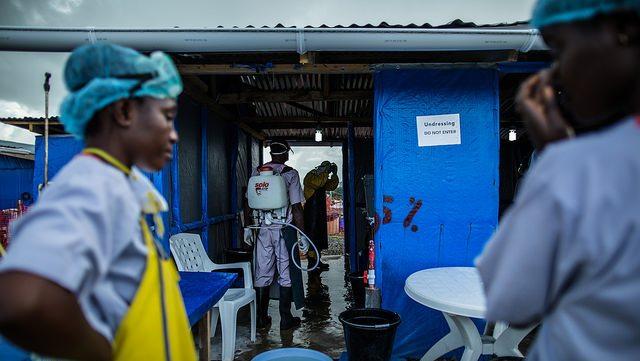The World Health Organization (WHO) today released more details about two Ebola infections recently confirmed by Mali's health ministry, both of them linked to a chain of transmission that resulted from a sick imam from Guinea who sought care at a Bamako clinic.
One of the patients is a 27-year-old fiancée of a nurse who cared for the imam. The nurse died of his infection on Nov 11. The woman's symptoms began on Nov 19, and she was hospitalized the next day at a new Ebola treatment center in Bamako.
The WHO said her case was detected early and most of her close contacts were already under surveillance because of her link to the nurse.
The other patient is a 27-year-old man whose mother and half-brother are listed as confirmed Ebola patients, both of whom died.. The man's symptoms began on Nov 19, and he was admitted yesterday to the new treatment facility, where his infection was confirmed the same day.
Mali's health ministry announcements of both cases appeared in media reports, but with very few details.
Mali's total at 8 cases, 6 deaths
The new infections push Mali's Ebola total to 8 cases, seven of which are linked to the imam. So far six deaths have been reported. Mali's first case was unrelated to the most recent transmission chains and involved a 2-year-old girl who traveled with relatives from Guinea and whose illness was detected in the western part of the country.
Patient contact monitoring has reportedly reached 99%, which from experience limiting the spread of the disease in Senegal and Nigeria is a hopeful sign that it might be rapidly contained in Mali, the WHO said. It added that staff from Mali's health ministry are meeting with their counterparts from Guinea to discuss cross-border measures for curbing the further spread of the virus from Guinea to Mali.
However, border health efforts could be complicated by problems on the Guinea side of the border, according to an update today from the United Nations (UN) Mission for Emergency Ebola Response (UNMEER). It said villagers in the Guinean border town of Kouremale have threatened contact tracers who arrived to follow up on Ebola cases linked to the unsafe burial of the local imam, who died in late October in Mali after seeing treatment at the Bamako clinic.
The update added that the Mali side of the border has a treatment center with active surveillance in place, but the Guinea side lacks treatment facilities, has limited surveillance, and is experiencing serious community resistance.
UN: Outbreak lifts food prices, saps earning power
In other news, the Ebola epidemic has boosted food prices in the three hardest-hit countries. especially in rural areas, according to a report yesterday from the United Nations Development Program (UNDP).
Ayodele Odusola, chief economist in the UNDP's African bureau, said in a statement, "Border closures, movement restrictions and a slowdown in farming activity are shaking food markets badly." Farmers have been unable to make a living and families are seeing fluctuating prices at the markets, with those in rural and remote areas seeing the biggest drop in their purchasing power, he said.
Since the outbreak began in March, purchasing power has dropped 20% in Sierra Leone and more than 25% in Liberia, according to the report. Guinea was able to stabilize a surge in rice prices through imports.
Coordinated action is needed to stabilize prices and ensure that people can buy and sell food, the UNDP said. It called for a four-part strategy that includes keeping borders open, providing safety nets such as farming subsidies and cash payments, stepping up support to help farmers prepare for the next planting season in February and March, and using fiscal policies to boost currencies and keep prices down.
Other developments
- Anthony Banbury, head of UNMEER, said the group isn't likely to meet its Dec 1 target of having 70% of patients under treatment and 70% of Ebola victims buried safely. He said the target has been achieved in some areas, but the mission will adjust to circumstances on the ground.
- Areas of greatest concern in Sierra Leone are rural areas, Makeni in the central part of the country, and Port Loko in the northwest, UNMEER said today. It added that Kenema, an original hot spot that had gone without a new case in more than 3 weeks, reported a death from Ebola on Nov 21. In Guinea, Ebola activity is spreading north toward the border with Mali, and active transmission is occurring in Kankan and Kouroussa, with a new 40-bed treatment center in Macenta already exceeding its capacity and the one in Gueckedou full and turning away patients in recent days, the group said.
- Liberia's government has acquired a plot of land to use as a national cemetery. UNMEER said the development is a critical step toward safe burials, because cremation, required in the area around Monrovia, is highly unpopular.
- About 150 health workers from the Economic Community of West African States (ECOWAS) countries are training in Accra, Ghana, this week in advance of their deployment to the three hardest-hit nations. The health workers are from Benin, Ghana, Ivory Coast, Mali, Niger, and Nigeria, UNMEER said today.
- The high demand for Ebola personal protective equipment (PPE), especially protective suits, in the United States is triggering shortages for the response in West Africa and raising its price, the Wall Street Journal reported yesterday. It said US hospitals and a big government purchase to shore up the US national stockpile are part of the reason. One of the PPE makers, DuPont, told the newspaper it has had to prioritize those who have direct contact with Ebola patients, and Doctors without Borders (MSF) said it has had to sell some of its PPE stockpile to other aid groups.
See also:
Nov 25 WHO update
Nov 24 UNDP press release
Nov 25 UNMEER report
Nov 24 WSJ report

















